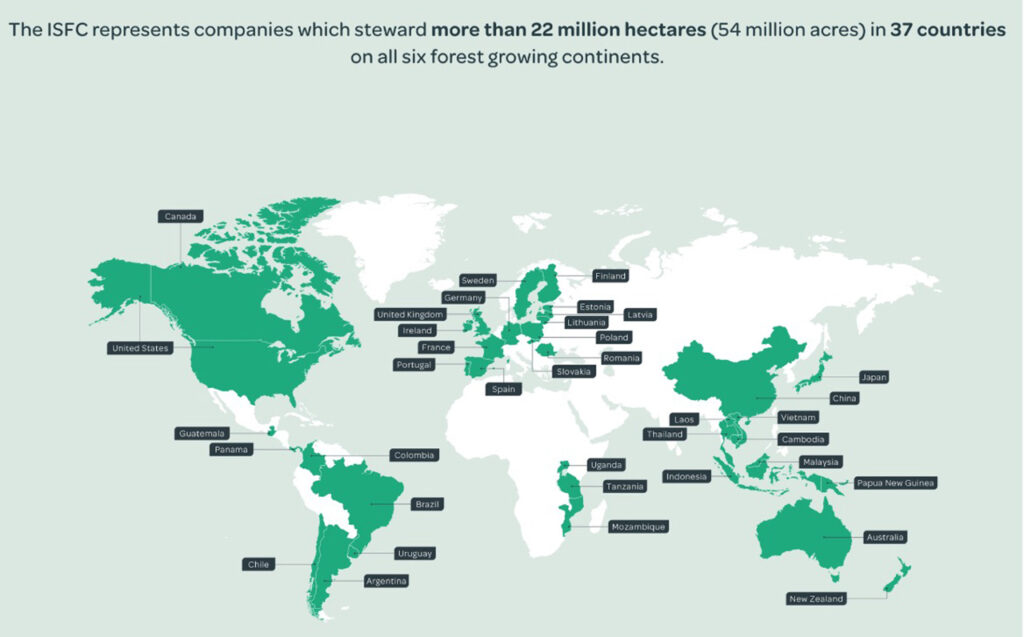Updated by "Forest Circular Economy" Editorial Board on July 15, 2025, 1:32 PM JST
Editorial Board, Forest Circular Economy
Forestcircularity-editor
We aim to realize "Vision 2050: Japan Shines, Forest Circular Economy" promoted by the Platinum Forest Industry Initiative. We will disseminate ideas and initiatives to promote biomass chemistry, realize woody and lumbery communities, and encourage innovation in the forestry industry in order to fully utilize forest resources to decarbonize the economy, strengthen economic security, and create local communities.
How to visualize the value of forests through accounting? The forestry sector has launched the world's first joint project to incorporate natural capital into corporate management through international collaboration. The International Sustainable Forestry Coalition (ISFC), an international alliance of forestry-related companies, announced on July 14 a cross-sector pilot project to introduce natural capital accounting. Eighteen companies that own or manage more than 24 million hectares of forest in 21 countries will participate in the project to empirically test a common international framework for evaluation and disclosure. From Japan, Mitsui & Co., Nippon Paper Industries, Oji Holdings, and Sumitomo Forestry were named to the project.
Natural capital refers to the value provided by forests, soil, water, air, biodiversity, and other natural components that are essential to businesses and society. This immeasurable benefit has not been adequately captured by conventional economic indicators and accounting standards. As a result, as the degradation of the natural environment becomes more serious on a global scale, structural issues have been highlighted in which economic activities undermine nature, which is the foundation of such activities. This project, which is attracting attention as a mechanism for visualizing natural capital and incorporating it into management decisions and information disclosure, is positioned as the world's first joint demonstration in which common guidance is formulated for the forestry sector and multiple companies test its application on their own premises.
This project will be conducted in collaboration with the Capitals Coalition, an international organization promoting natural capital valuation and disclosure, and the Task Force on Nature-related Financial Disclosure (TNFD), which advocates the disclosure of nature-related risks. The forestry industry's early formation of a common framework in anticipation of nature-related information disclosure requirements, which are expected to take off in the near future, is expected to have an impact on dialogue with other resource industries and investors.
Furthermore, this initiative is also being considered for dissemination at COP30 (Conference of the Parties to the United Nations Framework Convention on Climate Change) scheduled to be held in Brazil in November, and is attracting attention as a move from the forest industry to become involved in the creation of international rules for natural capital valuation.

Of the participating Japanese companies, Oji Holdings is the largest paper company in Japan, but also manages approximately 635,000 hectares of forests in Japan, Oceania, South America, and elsewhere as part of its paper material procurement and ESG strategies, and has acquired international forest certification. Sumitomo Forestry is an integrated forestry company that handles everything from forest management to timber, housing, and renewable energy, and has established a recycling-oriented business model with vast company-owned forests in Japan and overseas. Nippon Paper Industries also owns and manages more than 160,000 hectares of forests in Japan and overseas, and is engaged in a wide range of forest resource use, from lumber to chemical products and energy businesses, while maintaining its core business of paper manufacturing.
Mitsui, as a sogo shosha (general trading company), has invested and been involved in several projects utilizing forest resources, including overseas plantation and lumber business and woody biomass power generation, and is participating in this project from the perspective of connecting forests and the economy. It is highly significant that Japanese companies in different industries and positions are working together to form common natural capital accounting guidance.
ISFC is a private sector-led organization of forestry-related companies working together internationally to address climate change and biodiversity challenges while using forests sustainably. This project is spearheading the creation of rules to incorporate the value of natural capital into the economic system, with the forestry sector, which has the closest relationship with nature, taking the lead. How does the state of forest conservation affect the stable supply of water resources, and what risks does biodiversity degradation pose to future business opportunities? If these interdependencies with nature can be visualized in the form of accounting information, management will be better able to chart long-term, resilient business strategies.
It could also prompt a shift in thinking among all stakeholders in the forest industry. For companies, it is an opportunity to redefine the value of their forest assets and use them as a source of new corporate value creation. For researchers, it is an excellent research subject to explore the frontier of value assessment, and for governments, the international standards formed under the initiative of the private sector could serve as an important compass for formulating future environmental policies and industrial promotion measures.